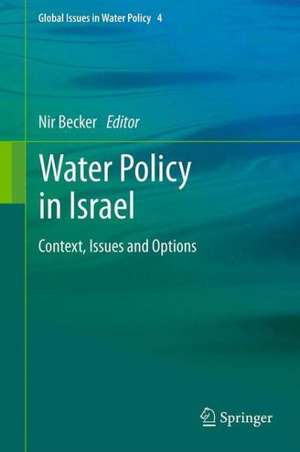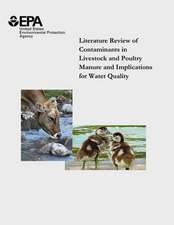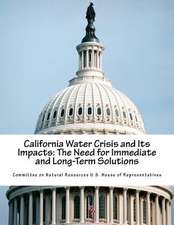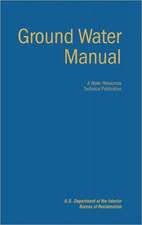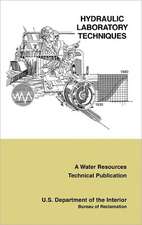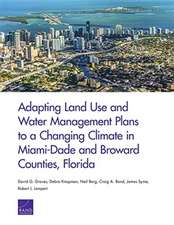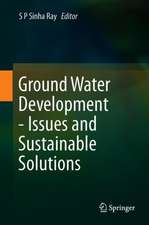Water Policy in Israel: Context, Issues and Options: Global Issues in Water Policy, cartea 4
Editat de Nir Beckeren Limba Engleză Hardback – 20 feb 2013
Water Policy in Israel is arranged in five broad sections: The dynamics of moving from one policy era to another; Supply management; Demand management; The importance of the Sea of Galilee and the Dead Sea; and Regional and global issues including water conflict and cooperation and climate change.
| Toate formatele și edițiile | Preț | Express |
|---|---|---|
| Paperback (1) | 945.14 lei 43-57 zile | |
| SPRINGER NETHERLANDS – 7 mar 2015 | 945.14 lei 43-57 zile | |
| Hardback (1) | 956.03 lei 43-57 zile | |
| SPRINGER NETHERLANDS – 20 feb 2013 | 956.03 lei 43-57 zile |
Din seria Global Issues in Water Policy
- 18%
 Preț: 956.81 lei
Preț: 956.81 lei - 15%
 Preț: 645.96 lei
Preț: 645.96 lei - 18%
 Preț: 966.27 lei
Preț: 966.27 lei - 15%
 Preț: 649.87 lei
Preț: 649.87 lei - 24%
 Preț: 639.68 lei
Preț: 639.68 lei - 20%
 Preț: 574.08 lei
Preț: 574.08 lei - 19%
 Preț: 519.80 lei
Preț: 519.80 lei - 18%
 Preț: 786.36 lei
Preț: 786.36 lei -
 Preț: 432.12 lei
Preț: 432.12 lei - 15%
 Preț: 649.06 lei
Preț: 649.06 lei - 15%
 Preț: 635.15 lei
Preț: 635.15 lei -
 Preț: 395.09 lei
Preț: 395.09 lei - 18%
 Preț: 953.65 lei
Preț: 953.65 lei - 20%
 Preț: 595.16 lei
Preț: 595.16 lei - 15%
 Preț: 664.61 lei
Preț: 664.61 lei - 15%
 Preț: 643.84 lei
Preț: 643.84 lei - 24%
 Preț: 820.64 lei
Preț: 820.64 lei - 18%
 Preț: 945.14 lei
Preț: 945.14 lei - 24%
 Preț: 800.73 lei
Preț: 800.73 lei - 24%
 Preț: 685.91 lei
Preț: 685.91 lei - 19%
 Preț: 555.11 lei
Preț: 555.11 lei - 23%
 Preț: 806.95 lei
Preț: 806.95 lei - 24%
 Preț: 698.16 lei
Preț: 698.16 lei - 15%
 Preț: 635.96 lei
Preț: 635.96 lei - 18%
 Preț: 959.82 lei
Preț: 959.82 lei - 18%
 Preț: 963.91 lei
Preț: 963.91 lei - 15%
 Preț: 642.18 lei
Preț: 642.18 lei - 18%
 Preț: 960.30 lei
Preț: 960.30 lei
Preț: 956.03 lei
Preț vechi: 1165.88 lei
-18% Nou
Puncte Express: 1434
Preț estimativ în valută:
182.93€ • 191.51$ • 151.37£
182.93€ • 191.51$ • 151.37£
Carte tipărită la comandă
Livrare economică 07-21 aprilie
Preluare comenzi: 021 569.72.76
Specificații
ISBN-13: 9789400759107
ISBN-10: 940075910X
Pagini: 308
Ilustrații: XII, 296 p. 72 illus., 33 illus. in color.
Dimensiuni: 155 x 235 x 22 mm
Greutate: 0.75 kg
Ediția:2013
Editura: SPRINGER NETHERLANDS
Colecția Springer
Seria Global Issues in Water Policy
Locul publicării:Dordrecht, Netherlands
ISBN-10: 940075910X
Pagini: 308
Ilustrații: XII, 296 p. 72 illus., 33 illus. in color.
Dimensiuni: 155 x 235 x 22 mm
Greutate: 0.75 kg
Ediția:2013
Editura: SPRINGER NETHERLANDS
Colecția Springer
Seria Global Issues in Water Policy
Locul publicării:Dordrecht, Netherlands
Public țintă
Upper undergraduateCuprins
1. Israeli Water Economy: Context and Setting.- 2. The Three Eras of Israeli Water Policies.- 3. Policy Stalemate and Policy Change in Israel's Water Policy 1970-2000s: Advocacy Coalitions and Policy Narratives.- 4. Water in Agriculture.- 5. Water for Nature Policy in Israel.- 6. Wastewater Reuse Policy in Israel.- 7. Water Desalination Policy in Israel Project Choice and Investment Policies: A Critical Look.- 8. Groundwater Management.- 9. Market Based Regulations on Water Users.- 10. Non-Price Mechanisms for Water Conservation in Israel.- 11. Water Quality Assessment and Management of Lake Kinnert: Effects and Feedbacks.- 12. The Dead Sea: Is the Read-Dead Canal a Sustainable Solution.- 13. Impacts of Changes in Regional Rainfall Distribution Patterns on Winter Agriculture in Israel.- 14. A State of Uncertainty With Regard to the Future Global Climate Calls for a New National Plan to Ensure the Safe Supply of Water for Israel.- 15. Basin Management in the Context of Israel and the Palestine Authority.- 16. The International Dimension of Water Policy in Israel.- 17. The Reforms Implemented by the Water Authority.- 18. Concluding Remarks: Policy Options and Research Agenda.- Index.
Textul de pe ultima copertă
This book deals with water policy in Israel. It offers a detailed examination of the main sources of Israel’s water, its principle consumers, the gap between supply and demand, and the complex, contentious work of analyzing and devising the nation’s water management and use policies.
Water Policy in Israel is arranged in five broad sections: The dynamics of moving from one policy era to another; Supply management; Demand management; The importance of the Sea of Galilee and the Dead Sea; and Regional and global issues including water conflict and cooperation and climate change.
Expert contributors discuss such topics as the history of Israel’s water policy, and the reasoning which explains long periods of policy stalemate, especially in situations where the risks generated by prolonged impasse are obvious. Other chapters describe efforts to meet agricultural demand for water by augmenting supplies with groundwater management, waste water re-use and desalination. The impact of climate change is discussed, along with the international dimensions of water policy, including many examples of conflict and cooperation between Israel and its neighbors, the Arab-Israeli conflict and possible areas of cooperation and conciliation. The last two chapters include a review of the last reforms initiated by the Israeli Water Authority in light of the foregoing issues which is followed by the last chapter, presenting the editor’s assessment and conclusions.
Water Policy in Israel is arranged in five broad sections: The dynamics of moving from one policy era to another; Supply management; Demand management; The importance of the Sea of Galilee and the Dead Sea; and Regional and global issues including water conflict and cooperation and climate change.
Expert contributors discuss such topics as the history of Israel’s water policy, and the reasoning which explains long periods of policy stalemate, especially in situations where the risks generated by prolonged impasse are obvious. Other chapters describe efforts to meet agricultural demand for water by augmenting supplies with groundwater management, waste water re-use and desalination. The impact of climate change is discussed, along with the international dimensions of water policy, including many examples of conflict and cooperation between Israel and its neighbors, the Arab-Israeli conflict and possible areas of cooperation and conciliation. The last two chapters include a review of the last reforms initiated by the Israeli Water Authority in light of the foregoing issues which is followed by the last chapter, presenting the editor’s assessment and conclusions.
Caracteristici
Offers a historical overview of water policy, and an assessment of the current policy atmosphere Expert contributors explore water supply and demand, and explain the entire spectrum of relevant issues The insights offered here, while specific to Israel, are broadly applicable to other countries
